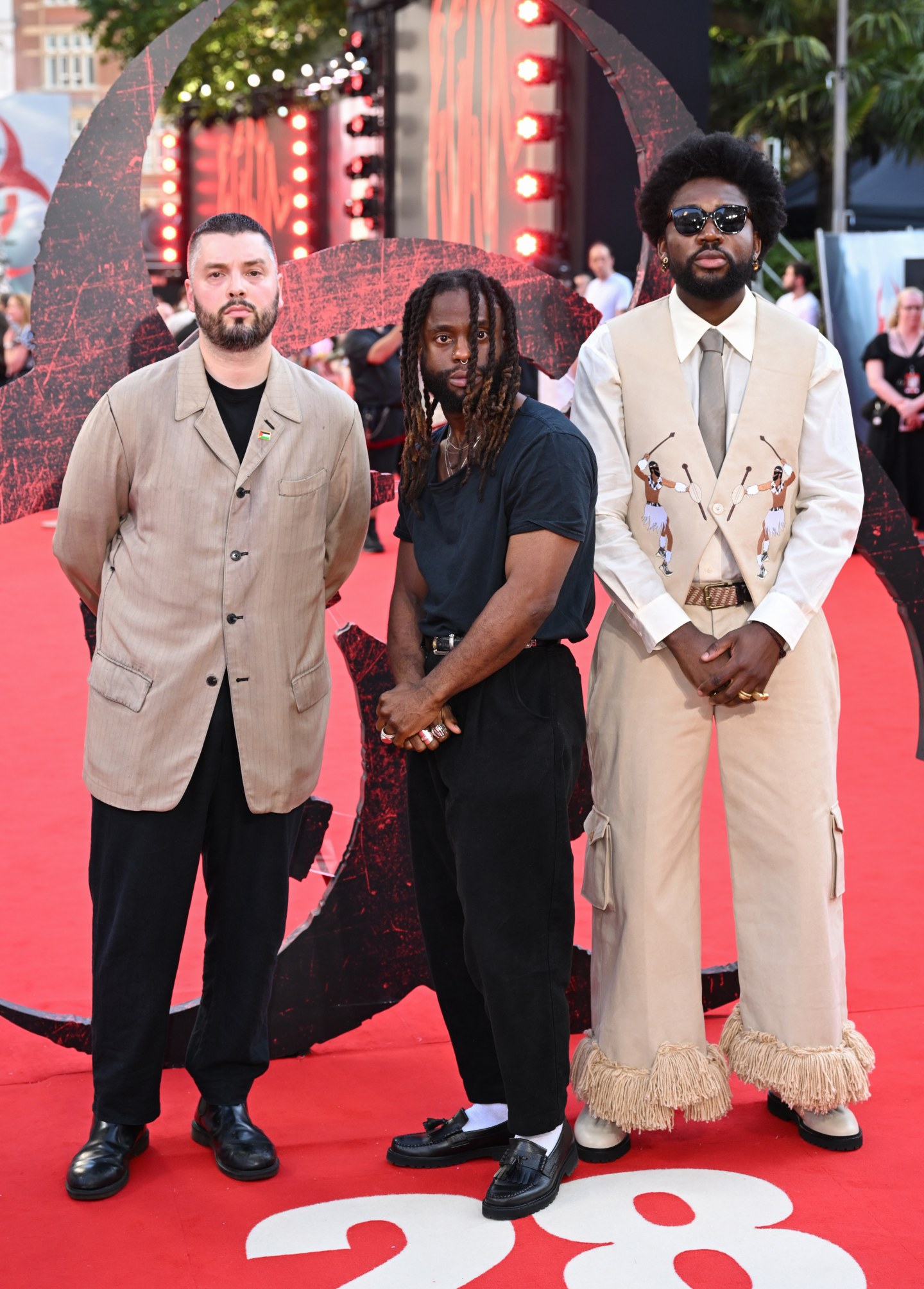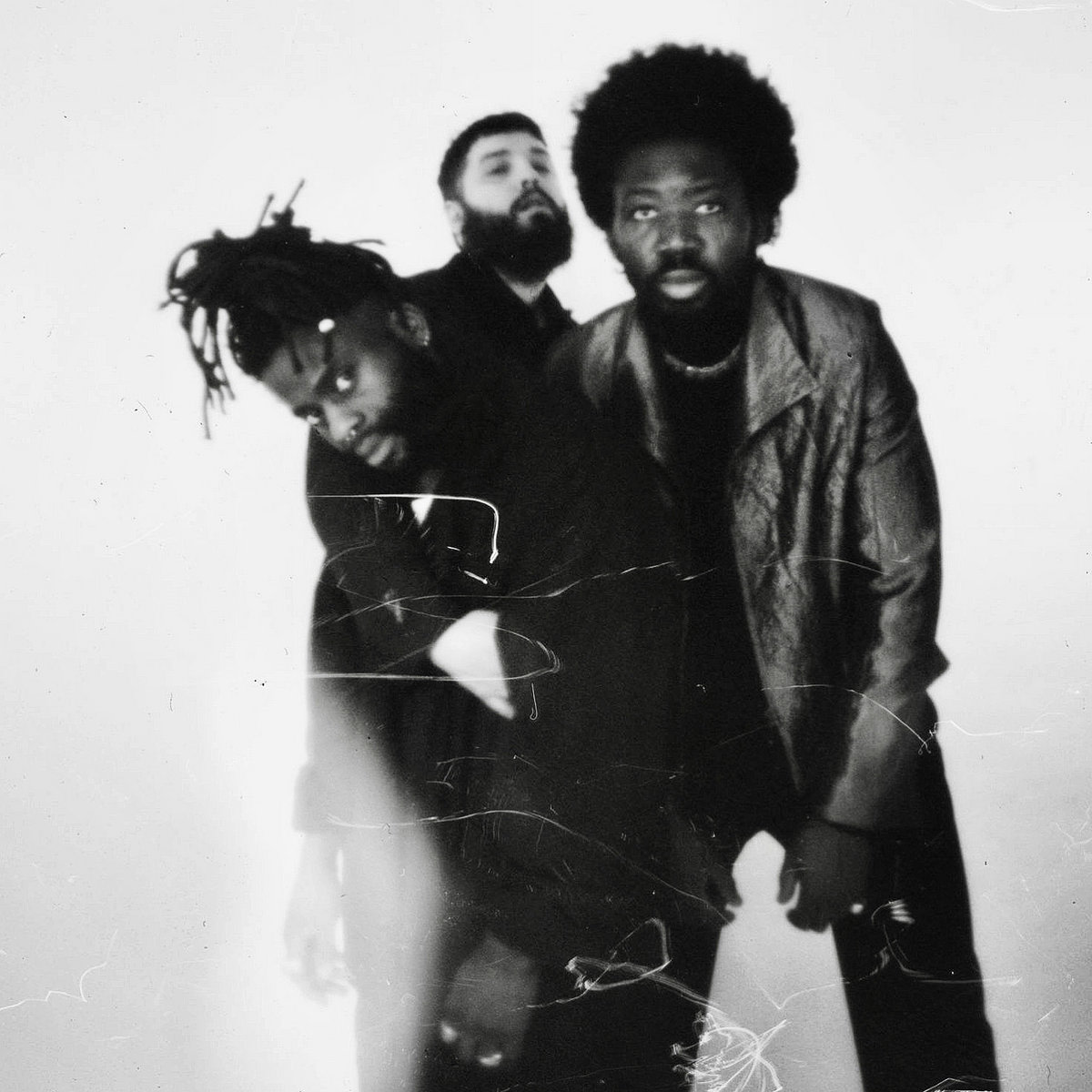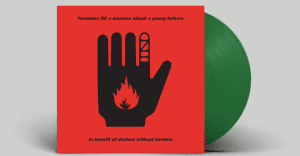28 Years Later and making 2025’s most haunting horror score”>
Courtesy of Young Fathers
28 Years Later has fast become one of the summer’s most entertaining and thought-provoking movies. Starring Jodie Comer, Ralph Fiennes, and Aaron Taylor-Johnson, the film is a continuation of director Danny Boyle’s 2002 flick 28 Days Later which saw Cillian Murphy wandering the abandoned streets of London in the immediate aftermath of a deadly virus. Three decades after the Rage outbreak, the story picks back up on a group of survivors living on a remote island. It follows a family trying to come together in the most challenging of circumstances, packing intense scenes of gruesome horror alongside ruminations on British identity — all which is underpinned by a riveting score that illuminates the darkest and most unsettling of feelings.
That comes courtesy of Young Fathers, the Scottish group comprising Alloysious Massaquoi, Kayus Bankole, and Graham ‘G’ Hastings, who were hand-picked by Boyle as he sought to build a world of disorientated people surviving in desperate circumstances. The three-piece — who won the Mercury Prize for their 2014 debut album Dead and worked with Boyle on his 2017 Trainspotting sequel — deliver a mixture of pop songs dropped into the action as needle drops (including “Lowly,” a haunted epic that captures the feeling of being pursued by the undead) and the booming sounds of a more traditional score. One standout scene, featuring Taylor-Johnson and his young son racing across water while being chased by a group of infected zombies, is granted extra gravitas by a stunning orchestral arrangement, a world away from anything on the band’s latest album, 2023’s Heavy Heavy.
“[Boyle] wanted the music to be as much as a character as any other character in the film,” Bankole tells The FADER of working with the Oscar-winning director. Ahead, Young Fathers discuss the “natural evolution” of making music for the big screen and how this latest collaboration showed them new avenues of working more than a decade into their career.
The FADER: You all first worked with Danny Boyle on T2 Trainspotting. Did you know at the time that you’d work together again?
Graham ‘G’ Hastings: No. Not at all. Danny actually got in touch after we performed at the Royal Albert Hall in London last year. I don’t know if that sparked the idea or if he’d already been thinking about it, but soon after that, he reached out with the idea that we could do a soundtrack. We agreed before even knowing what the project was, because it was Danny.
Bankole: We’ve always been up for it. Graham had done a score a few years ago, for The Bike Thief, so he had some experience. But this was the first time all of us were involved together in scoring a film.
Alloysious Massaquoi: We’re big film fans. A lot of our musical influences come from movies, and the kind of music we make is already very cinematic—it lends itself well to visuals. When we’re writing songs, we sometimes use imagery or film clips to spark emotion. So this felt like a natural evolution.
“[Boyle] wanted the music to be as much as a character as any other character in the film.”
What was the biggest challenge in scoring 28 Years Later?
Hastings: The hardest part was adapting to someone else’s vision. We’re used to going into the studio and doing whatever we want, with the only compromises being among ourselves. But with this, you’re serving a director, a picture, a story, and that’s a completely different discipline. You have to listen, adjust, and often let go of what you’d normally do.
At first, we tried to use the same approach as usual, making music freely, not always to picture, and then test how it worked in different scenes. Sometimes you’d think something was perfect, and it’d get moved or cut. So you had to be flexible. Danny and editor Jon Harris were both involved, but mostly we worked directly with Danny. He was always honest, sometimes brutally so, which we actually appreciated. One day he came to see us and he got emotional when he heard some of the music we had made. That vulnerability showed us how much he still cares.
 28 Years Later and making 2025’s most haunting horror score”>
28 Years Later and making 2025’s most haunting horror score”>
Young Fathers at the world premiere of ’28 Years Later.’
Photo by Jeff Spicer/Getty Images
What did Danny Boyle tell you about the world the film exists in?
Massaquoi: He wanted the music to reflect a sense of community. An outsider, makeshift society surviving in isolation.
Danny had this vision of drums and vocals, minimal technology, reflecting the film’s island setting. He was clear that he didn’t want the music to just sit in the background. He wanted it to feature, to be present. That was a relief to us because the music that we make is always forward and intense. There’s not really much meandering in Young Fathers music. I think our presence is felt in the film.
Let’s talk about the track “Boots.” That Rudyard Kipling poem is used to great effect in the trailer. How did that piece come together?
Hastings: “Boots” wasn’t originally in the film, it started as a trailer concept. Danny loved it so much he decided to include it. The Kipling recording had that immediate, emotional impact. It just took you somewhere. He also wanted the music to feel British and grounded in the location, and this poem gave it that darker, more menacing energy. It transformed the scene completely.
Originally, the sequence was a bonding moment between a father and son. But with the Kipling voiceover and our score, it became something more foreboding. It reminds you of the stakes and pulls everything together in a really powerful way.
“The music that we make is always forward and intense. I think our presence is felt in the film.”
Another standout moment is “Causeway,” which is this big, cinematic orchestral track. Was it fun to lean into making something so far removed from the music you normally make?
Hastings: Yeah, “Causeway” and “Remember” were both major pieces for us. They were definitely challenging. We worked with [composers] Dean Valentine and Matthew Sheeran on those, and added our own drums and textures.
Danny pushed us to work with an orchestra, and we were initially unsure. But we’re glad we did. Rosie Danvers handled the orchestration and recorded it with a 66-piece orchestra. It was a surreal moment—hearing something you created come to life like that. The “Causeway” chase could’ve used classic horror-score tropes, but he [Boyle] flipped it. It becomes something emotional, even poetic.
You all are working on a new album. Will this experience influence your next record?
Hastings: Everything you experience bleeds into what you make next. Our sound is already an amalgamation of three different people with different lives and tastes, and this score just added another layer.
Massaquoi: One thing we’ll take forward is arrangement. Working to picture forces you to structure music in unconventional ways, to stretch or cut or layer things differently than you might on a regular track. That taught us a lot. Even without a film, we can use those techniques going forward. It opens up new ways of thinking about music. We don’t always know what’s next, but that’s what keeps it exciting.





